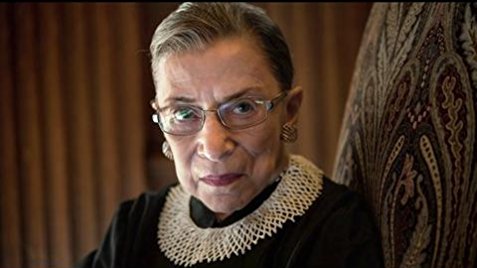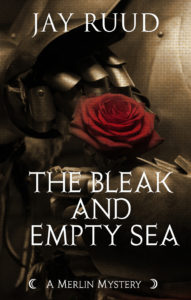RBG
Julie Cohen and Betsy West (2018)
[av_image src=’http://jayruud.com/wp-content/uploads/2014/12/3-12.jpg’ attachment=313′ attachment_size=’square’ align=’left’ animation=’left-to-right’ link=” target=” styling=” caption=’yes’ font_size=” appearance=’on-hover’]
Three Tennysons/Half Shakespeare[/av_image]
[av_textblock size=” font_color=” color=”]
The U.S. Supreme Court is not generally looked upon as a hotbed of human drama, a mine from which the stuff of emotionally riveting films might be extracted. Nevertheless, within the past year two films focusing on important, trailblazing justices have made their way into a popular cinematic scene that is currently defined by superhero movies and CGI special effects. Such films fall into the category of “And now for something completely different…”
The first of these, Reginald Hudin’s Marshall, was a conventional biopic of Thurgood Marshall, first African-American justice on the United States Supreme Court. Conceived in the current fashion for such films (the pattern set by Spielberg’s Lincoln), the movie focused on a single incident in Marshall’s career as an attorney for the NAACP: his defense of an African-American chauffeur in Bridgeport, Connecticut, accused of raping a rich white society woman. Starring Chadwick Bozeman, Josh Gad and Kate Hudson, that film was admired by critics but barely made back its $12 million budget in theaters. How much less likely to be a popular success is the current film, RBG, a documentary focused on the life and career of 85-year old Supreme Court veteran Ruth Bader Ginsberg?
But then, how likely was Bader Ginsberg to become a social media star, with her face on countless memes and T-shirts, and a book extolling her as Notorious RBG—a name borrowed from the rapper “Notorious BIG,” someone she claims in the film to have a lot in common with: “We both come from Brooklyn.”
In fact, RBGhas grossed about the same amount at the box office as Marshalldid—not bad for a documentary. Turns out Bader Ginsburg’s story is appealing, particularly among women like my wife who wear T-shirts that reads “Only RBG can judge me!” For those unfamiliar with Bader Ginsburg’s story, the film traces her highly successful career as a lawyer for the A.C.L.U. in the 1970s, when she argued six cases before the Supreme Court, winning five of them. All of these cases involved questions of gender equality—a concept that seemed completely foreign to the all-male court of the time. The cases involved equal pay for equal work as well as family benefits for surviving husbands that previously had only been available for wives. Full gender equality is far from having been achieved, but without Bader Ginsberg, the film makes us feel, it would barely be recognized.
Cohen and West show in the film how Bader Ginsberg came to recognize the need for gender discrimination to be recognized in the courts. They take the viewers through a glimpse of her humble childhood in Brooklyn, daughter of a first-generation Jewish family, and her growing up to attend Cornell University, where she met her husband-to-be Marty, who recognized her potential and encouraged her in her pursuit of her law career. Both Ruth and Marty were accepted into Harvard Law School, Ruth one of nine women admitted among a class of several hundred in the late 1950s—and, like the other women, she was interviewed by the dean and pushed to justify her taking a place that should have gone to a man. She was the only woman in her class to make the Law Review, but in her final year she had to transfer to Columbia to take care of Marty, then a tax attorney in New York, who had contracted cancer and had to undergo radiation therapy. Still, she graduated, and despite her sterling record in law school could not land a job with any firm in New York City, none of whom would interview her when they learned she was a woman.
In this way, Bader Ginsberg was all but forced into a career as a professor and an A.C.L.U. lawyer, specializing in cases that involved the kinds of things she had faced in her own career: gender inequality.
The film duly moves through Bader Ginsberg’s appointment as federal judge by President Carter in 1980 and her appointment to the U.S. Supreme Court by President Clinton (when Mario Cuomo declined). We are treated to footage of her testimony before the Senate Judicial Committee (where we see familiar faces like Joe Biden, Orin Hatch and Ted Kennedy) before her nearly unanimous approval by the Senate. And we move through her two decades on the court, where in her early years she was a centrist consensus-builder, and in later years, as the court has moved further and further to the right, she has become the chief voice of dissent and in many cases, the conscience of the court.
But I don’t mean to suggest that the movie is a straightforward chronicle of Bader Ginsberg’s life and career. We do get to know her as a flesh-and-blood person as the film progresses, largely due to the access that the filmmakers were allowed to the octogenarian justice as they followed her in 2016 to a number of public appearances in Washington as well as Chicago, and were able to spend some time in a crucial face-to-face interview in 2017. The filmmakers also interview Bader Ginsberg’s children, her granddaughter (who is now herself a graduate of Harvard Law School), and her two oldest friends. Clinton is interviewed briefly, as is longtime conservative Senator Orrin Hatch, and feminist icon Gloria Steinem, and others. And Bader Ginsberg’s husband Marty, who died in 2010, is shown in archival interview footage, talking about his wife’s limited cooking skills and describing how he would often have to tell her when it was time to stop working and come home to eat dinner, or when it was time for her to stop working and come to bed at 4 a.m. In many ways the film is their love story. She talks about her friendship with other Justices, in particular Sandra Day O’Connor, the first woman on the court, and how the two of the feminized the judicial robes with white collars, and Antonin Scalia, the conservative justice with whom she seldom agreed on court decisions but who was a very close friend. Nor does the film ignore Bader Ginsberg’s one notable slip from judicial professionalism: her comments during the 2016 election about Donald Trump’s unsuitability to be president—comments for which she was later obliged to apologize. But even these comments reflect her fierce devotion to the social causes to which she had devoted her life.
All describe a woman who was driven from an early age, who has a brilliant legal mind, and who works tirelessly. We see Bader Ginsberg, who has twice survived bouts with cancer, working out vigorously with a trainer and telling her interviewers how determined she is to keep fighting the good fight as long as she is physically and mentally able. One leaves the theater hoping that will be for many years yet. Three Tennysons and half a Shakespeare for this fascinating documentary.
NOW AVAILABLE:
If you like these reviews, you might enjoy Jay Ruud’s most recent novel, now available from the publisher at https://encirclepub.com/product/the-bleak-and-empty-sea/. Also available from Amazon or Barnes and Noble.
When word comes to Camelot that Sir Tristram has died in Brittany of wounds suffered in a skirmish, and that his longtime mistress, La Belle Isolde, Queen of Cornwall, has subsequently died herself of a broken heart, Queen Guinevere and her trusted lady Rosemounde immediately suspect that there is more to the story of the lovers’ deaths than they are being told. It is up to Merlin and his faithful assistant, Gildas of Cornwall, to find the truth behind the myths and half-truths surrounding these untimely deaths. By the time they are finally able to uncover the truth, Gildas and Merlin have lost one companion and are in danger of losing their own lives.
Order from Amazon here: https://www.amazon.com/Bleak-Empty-Sea-Tristram-Mystery/dp/1893035735/ref=sr_1_1?s=books&ie=UTF8&qid=1503328086&sr=1-1&keywords=Bleak+and+Empty+Sea
Order from Barnes and Noble here: https://www.barnesandnoble.com/w/the-bleak-and-empty-sea-jay-ruud/1126958139?ean=9781893035737


